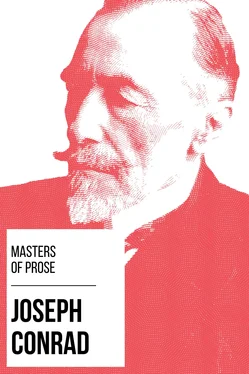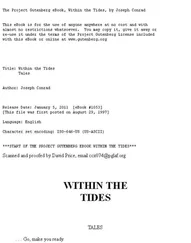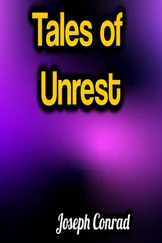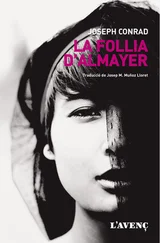"'Mistah Kurtz—he dead.'
"All the pilgrims rushed out to see. I remained, and went on with my dinner. I believe I was considered brutally callous. However, I did not eat much. There was a lamp in there—light, don't you know—and outside it was so beastly, beastly dark. I went no more near the remarkable man who had pronounced a judgment upon the adventures of his soul on this earth. The voice was gone. What else had been there? But I am of course aware that next day the pilgrims buried something in a muddy hole.
"And then they very nearly buried me.
"However, as you see, I did not go to join Kurtz there and then. I did not. I remained to dream the nightmare out to the end, and to show my loyalty to Kurtz once more. Destiny. My destiny! Droll thing life is—that mysterious arrangement of merciless logic for a futile purpose. The most you can hope from it is some knowledge of yourself—that comes too late—a crop of unextinguishable regrets. I have wrestled with death. It is the most unexciting contest you can imagine. It takes place in an impalpable grayness, with nothing underfoot, with nothing around, without spectators, without clamor, without glory, without the great desire of victory, without the great fear of defeat, in a sickly atmosphere of tepid skepticism, without much belief in your own right, and still less in that of your adversary. If such is the form of ultimate wisdom, then life is a greater riddle than some of us think it to be. I was within a hair's-breadth of the last opportunity for pronouncement, and I found with humiliation that probably I would have nothing to say. This is the reason why I affirm that Kurtz was a remarkable man. He had something to say. He said it. Since I had peeped over the edge myself, I understand better the meaning of his stare, that could not see the flame of the candle, but was wide enough to embrace the whole universe, piercing enough to penetrate all the hearts that beat in the darkness. He had summed up—he had judged. 'The horror!' He was a remarkable man. After all, this was the expression of some sort of belief; it had candor, it had conviction, it had a vibrating note of revolt in its whisper, it had the appalling face of a glimpsed truth—the strange commingling of desire and hate. And it is not my own extremity I remember best—a vision of grayness without form filled with physical pain, and a careless contempt for the evanescence of all things—even of this pain itself. No! It is his extremity that I seem to have lived through. True, he had made that last stride, he had stepped over the edge, while I had been permitted to draw back my hesitating foot. And perhaps in this is the whole difference; perhaps all the wisdom, and all truth, and all sincerity, are just compressed into that inappreciable moment of time in which we step over the threshold of the invisible. Perhaps! I like to think my summing-up would not have been a word of careless contempt. Better his cry—much better. It was an affirmation, a moral victory paid for by innumerable defeats, by abominable terrors, by abominable satisfactions. But it was a victory! That is why I have remained loyal to Kurtz to the last, and even beyond, when a long time after I heard once more, not his own voice, but the echo of his magnificent eloquence thrown to me from a soul as translucently pure as a cliff of crystal.
"No, they did not bury me, though there is a period of time which I remember mistily, with a shuddering wonder, like a passage through some inconceivable world that had no hope in it and no desire. I found myself back in the sepulchral city resenting the sight of people hurrying through the streets to filch a little money from each other, to devour their infamous cookery, to gulp their unwholesome beer, to dream their insignificant and silly dreams. They trespassed upon my thoughts. They were intruders whose knowledge of life was to me an irritating pretense, because I felt so sure they could not possibly know the things I knew. Their bearing, which was simply the bearing of commonplace individuals going about their business in the assurance of perfect safety, was offensive to me like the outrageous flauntings of folly in the face of a danger it is unable to comprehend. I had no particular desire to enlighten them, but I had some difficulty in restraining myself from laughing in their faces, so full of stupid importance. I dare say I was not very well at that time. I tottered about the streets—there were various affairs to settle—grinning bitterly at perfectly respectable persons. I admit my behavior was inexcusable, but then my temperature was seldom normal in these days. My dear aunt's endeavors to 'nurse up my strength' seemed altogether beside the mark. It was not my strength that wanted nursing, it was my imagination that wanted soothing. I kept the bundle of papers given me by Kurtz, not knowing exactly what to do with it. His mother had died lately, watched over, as I was told, by his Intended. A clean-shaved man, with an official manner and wearing gold-rimmed spectacles, called on me one day and made inquiries, at first circuitous, afterwards suavely pressing, about what he was pleased to denominate certain 'documents.' I was not surprised, because I had had two rows with the manager on the subject out there. I had refused to give up the smallest scrap out of that package, and I took the same attitude with the spectacled man. He became darkly menacing at last, and with much heat argued that the Company had the right to every bit of information about its 'territories.' And, said he, 'Mr. Kurtz's knowledge of unexplored regions must have been necessarily extensive and peculiar—owing to his great abilities and to the deplorable circumstances in which he had been placed: therefore'—I assured him Mr. Kurtz's knowledge, however extensive, did not bear upon the problems of commerce or administration. He invoked then the name of science. 'It would be an incalculable loss if,' &c., &c. I offered him the report on the 'Suppression of Savage Customs,' with the postscriptum torn off. He took it up eagerly, but ended by sniffing at it with an air of contempt. 'This is not what we had a right to expect,' he remarked. 'Expect nothing else,' I said. 'There are only private letters.' He withdrew upon some threat of legal proceedings, and I saw him no more; but another fellow, calling himself Kurtz's cousin, appeared two days later, and was anxious to hear all the details about his dear relative's last moments. Incidentally he gave me to understand that Kurtz had been essentially a great musician. 'There was the making of an immense success,' said the man, who was an organist, I believe, with lank gray hair flowing over a greasy coat-collar. I had no reason to doubt his statement; and to this day I am unable to say what was Kurtz's profession, whether he ever had any—which was the greatest of his talents. I had taken him for a painter who wrote for the papers, or else for a journalist who could paint—but even the cousin (who took snuff during the interview) could not tell me what he had been—exactly. He was a universal genius—on that point I agreed with the old chap, who thereupon blew his nose noisily into a large cotton handkerchief and withdrew in senile agitation, bearing off some family letters and memoranda without importance. Ultimately a journalist anxious to know something of the fate of his 'dear colleague' turned up. This visitor informed me Kurtz's proper sphere ought to have been politics 'on the popular side.' He had furry straight eyebrows, bristly hair cropped short, an eye-glass on a broad ribbon, and, becoming expansive, confessed his opinion that Kurtz really couldn't write a bit—'but heavens! how that man could talk! He electrified large meetings. He had faith—don't you see?—he had the faith. He could get himself to believe anything—anything. He would have been a splendid leader of an extreme party.' 'What party?' I asked. 'Any party,' answered the other. 'He was an—an—extremist.' Did I not think so? I assented. Did I know, he asked, with a sudden flash of curiosity, 'what it was that had induced him to go out there?' 'Yes,' said I, and forthwith handed him the famous Report for publication, if he thought fit. He glanced through it hurriedly, mumbling all the time, judged 'it would do,' and took himself off with this plunder.
Читать дальше












